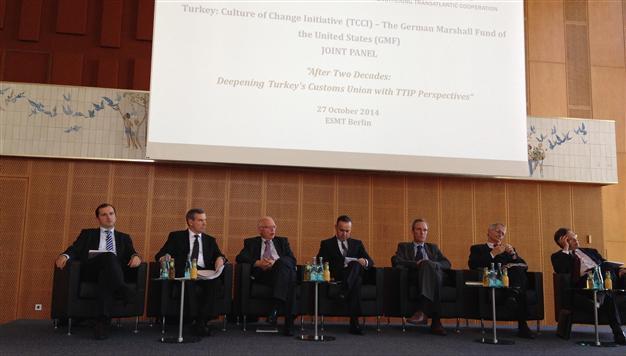Turkey should start alternative trade talks with US, says World Bank envoy
BERLIN

Raiser attended a panel held by the Turkish Industry and Business Association (TÜSİAD). AA Photo
The Turkey director of the World Bank, Martin Raiser, has advised Turkey to engage in parallel negotiations with the U.S. in order to prevent adverse effects of the Transatlantic Trade and Investment Partnership (TTIP).Washington has so far not made any moves to initiate such a process, Raiser said late on Oct. 27, adding that it was down to Turkey to take the first step.
“The planned trade deal between the U.S. and the EU will harm Turkey, as Turkey is not a member of the EU, but a member of the Customs Union. There is no easy answer to solve this problem. We are suggesting that Turkey starts parallel negotiations with the U.S. to make a similar trade deal with it,” he said at a panel held by the Turkish Industry and Business Association (TÜSİAD), titled “20 Years Later: Deepening Turkey’s Customs Union on Perspectives of the Transatlantic Trade and Investment Partnership.”
“However, I am not sure the U.S. government is currently in a position to offer such negotiations to Turkey. If such negotiations are not possible for Turkey to start with the U.S., then Turkey should concentrate on making the TTIP open to third parties, including Turkey. And the criteria to join the deal must be defined by the U.S. and the EU clearly at the very beginning,” he added.
A transatlantic free trade deal currently being negotiated between the EU and the U.S. could cause the Turkish economy to lose $20 billion if Turkey is left out of the final agreement, as shown by an analysis prepared by the Brookings Institute and TÜSİAD in 2013.
Turkish officials argue that potential future free trade agreements signed by the EU with other countries, such as the U.S., would effectively open Turkey’s market to exports from these countries because Ankara is a signatory of the Customs Union deal.
“Turkey is not a part of the decision-making process in the existing system of the Customs Union. Turkey could therefore face competitive pressures from several low-cost third-party countries with which the EU has separate trade deals,” Arzuhan Doğan Yalçındağ, the Doğan TV Holding Chairwoman and former head of TÜSİAD said during the panel.
She added that Turkey should be able to participate in the decision making processes so as to enable the Customs Union between the EU and Turkey to be able to function effectively and fairly.
“Turkey gives great importance to the TTIP. If Turkey is not included in this process, we fear our interests would be harmed. In this vein, the EU can now declare the opening of the Transatlantic market to its long-standing members of the single market, Turkey, Norway and Switzerland, in a special article in the final agreement,” she noted.
During her visit to Ankara earlier this month, U.S. Secretary of Commerce Penny Pritzker said that despite the good trade relations between Turkey and the U.S., it is not the right time to begin talks about including Turkey in the TTIP process with Europe.
“Let me be clear about the TTIP. Turkey and the U.S. are great allies and nothing is going to change that. We have a mechanism called the High Level Committee, which we use to keep Turkey abreast of the TTIP conversations, but engaging further with the TTIP at this time, before the necessary economic reforms are taken, doesn’t make sense for either Turkey or the U.S.,” Pritzker said during an interview on Oct. 2.
















